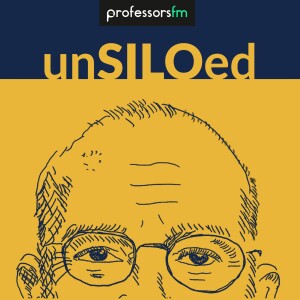
242. Fixing Economics with Insights from Other Sciences feat. George Cooper
 2023-02-03
2023-02-03
How did we get to the financial crisis of 2008? Where were the signs, and what did we miss? For these questions and more, we turn to the person who wrote a book on the subject.
Dr. George Cooper is an author and the chief investment Officer of Equitile investments. He has 27 years of investment experience including with JP Morgan, Goldman Sachs, Deutsche Bank, and BlueCrest Capital before. His first book, The Origin of Financial Crises: Central Banks, Credit Bubbles, and the Efficient Market Fallacy, has an updated version out, and his latest book is called Fixing Economics: The story of how the dismal science was broken - and how it could be rebuilt.
George and Greg talk about the limits of neoclassical economics, the importance of systems thinking, and they go into the origins of financial crises. George and Greg talk about the ideas of Keynes, Minsky, Marx, Maxwell, Kuhn, and Brahmagupta. George introduces his view of dynamic equilibrium and his perspective on Modern Money Theory and other alternative schools of economics.
Episode Quotes:Recognizing the role of credit creation system
11:18: When you understand the connection between asset inflation, profit formation, and credit creation. When you realize that all three of those are intimately entwined, then you can no longer believe in an equilibrium model anymore because asset inflation leads to credit creation. And interestingly, the creation of credit also leads to a boom in corporate profits.
49:21: When we talk about money creation, we need to also think about anti-money creation, which is debt. So debt and money combined are literally created and destroyed.
Are we analyzing the wrong side of economic theory?
16:07: We tend to analyze the economy only from the private sector side, but there are no successful economies in the world that are 100 percent private sector. Every successful economy in the world has a public sector that is comparable in size to the private sector.
Finding important truths and valid insights in economics
25:51: Many social scientists, even today, talk about emotions as if it were one great category, but emotions to their work by virtue of their specificity, that is, by their community entities and action tenses that are also very specific or different from the different emotions. So if you are angry, you want to make the other person suffer. If you hate, then you want other person to disappear from the face of the earth.
Show Links:Recommended Resources:- Hyman Minsky
- John Maynard Keynes
- Paradox of Thrift
- Austrian School
- Lehman Brothers
- William Harvey
- Alfred Wegener
- Charles Darwin
- James Maxwell
- Brahmagupta
- Luca Pacioli
- Benoit Mandelbrot
- The Structure of Scientific Revolutions
- unSILOed EP #12 | Understanding Carry Trades feat. Kevin Coldiron
- Professional on Equitile Investments
- Author’s Profile on Penguin Random House Profile
- Speaker’s Profile on Specialist Speaker
- George Cooper’s Website
- Articles on Evonomics
- The Origin of Financial Crises: Central Banks, Credit Bubbles, and the Efficient Market Fallacy
- Money, Blood and Revolution: How Darwin and the doctor of King Charles I could turn economics into a science
- Fixing Economics: The story of how the dismal science was broken - and how it could be rebuilt
More Episodes
Create your
podcast in
minutes
- Full-featured podcast site
- Unlimited storage and bandwidth
- Comprehensive podcast stats
- Distribute to Apple Podcasts, Spotify, and more
- Make money with your podcast
It is Free
- Privacy Policy
- Cookie Policy
- Terms of Use
- Consent Preferences
- Copyright © 2015-2024 Podbean.com






